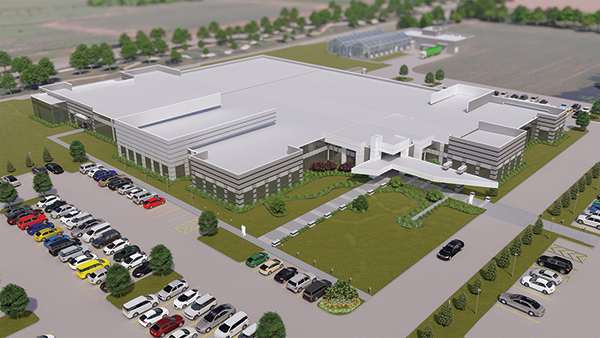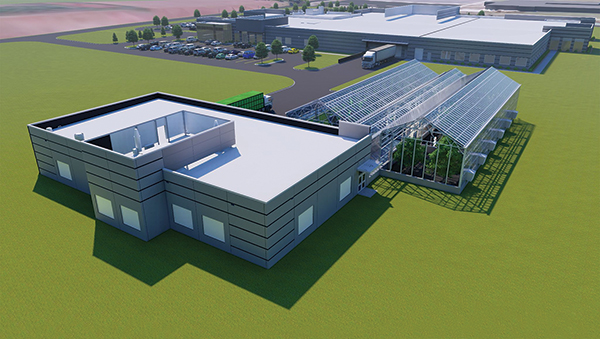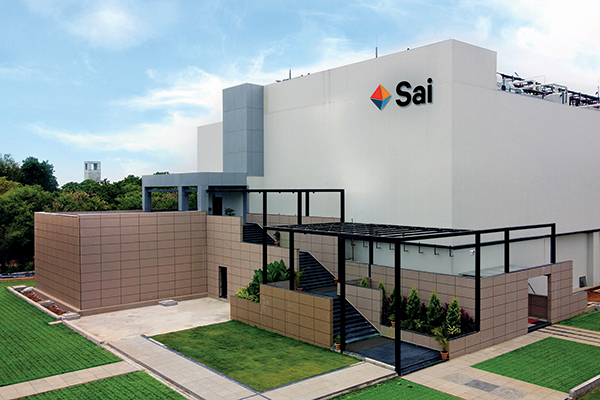Ajourney through a growing Indian multinational’s past year casts light on three leading biotech locations around the world. For Sai Life Sciences, triangulation is key to its round-the-world, round-the-clock strategy.
In August 2021, the global contract research, development and manufacturing company (CRO-CDMO), celebrated the grand opening of a new biology facility at its integrated campus in Hyderabad, India, which it called an important milestone in its quest to be a go-to for “Discovery Biology.”
“The new facility marks the culmination of a journey we began two years ago, of creating differentiated value for our discovery clients through an integrated delivery model across Boston and Hyderabad,” said Sai Life Sciences CEO and Managing Director Krishna Kanumuri. “By bringing the best of talent, technology, complementary services and efficiency we are confident of bringing unique value to our clients and are keen to take on integrated discovery mandates, at scale.”
The new facility unifies the company’s discovery, early and late phase development and clinical supply capabilities in a single 13-acre campus housing over 1,000 scientists — nearly half of approximately 2,200 Sai employees across sites in India, the United Kingdom and the United States. The company’s discovery services support companies from start-ups to large pharma companies across therapeutic areas that include oncology, antivirals and inflammation among others. The company says it “has advanced 35+ programs to different clinical phases (IND to Phase-III) with the average turnaround time from Hit/Lead to Candidate being 18 months.”
In 2019, the company opened its first international R&D facility with a biology lab in Cambridge, Massachusetts, designed to offer startup and biotech companies in the world-leading life sciences region biology services to address exploratory and custom biology needs. It added cellular analysis capabilities there in September 2020.
Deepening capabilities at both campuses means increasing the value of a truly global offering from these two cities whose time zones are precisely 9.5 hours apart. That means when the sun’s setting on the workday in Greater Boston, it’s about to rise on tomorrow in Hyderabad.
The company says the integrated delivery model for biology “aims to provide clients an optimal solution in terms of expertise, speed, and cost. In this model, critical exploratory work involving close hand-in-hand collaboration with clients is done at the Boston lab, following which, established assays are tech transferred to Hyderabad for greater throughput. A seamless and rapid technology transfer across sites is achieved through a unified global organization and matching infrastructure across both sites. Encouraged by the initial success with the Boston-Hyderabad integrated model, the company plans to expand its capacity at both locations in the coming months.”
Made in Manchester
In January 2021, the company announced plans to double its headcount and expand technical capabilities at its site in Manchester, England, which serves a global clientele.
“We are truly heartened by our customers’ response to our Manchester site,” Kanumuri said. “The site serves as a vital bridge to our pilot and manufacturing facilities in India, enabling seamless integration with the rest of our service offerings across the USA and India, spanning the drug discovery, development, and commercialization continuum.”
Biotech Campus Expansion Creates More Room for Growth and Innovation
The HudsonAlpha Institute for Biotechnology, a nonprofit genomics and genetics research institute in Huntsville, Ala., is expanding its campus, providing growth opportunities for its agriscience program and a global life sciences company.


“I am thrilled to see the vision that Lonnie and I had over a decade ago continue to take shape and evolve to provide solutions to help our world,” said Jim Hudson, HudsonAlpha co-founder. “Our research teams will now have the capabilities to take our plant science and sustainable agriculture program to the next level.”
The expansion will consist of two facilities: the global headquarters for resident associate company Discovery Life Sciences, and new state-of-the-art laboratory and greenhouse space for HudsonAlpha’s Center for Plant Science and Sustainable Agriculture.
“This is a significant milestone not only for HudsonAlpha, but the entire state as well,” said Carter Wells, vice president for economic development. “Through this expansion, HudsonAlpha further solidifies its leadership position and expertise in plant genomics. Additionally, Discovery Life Sciences’ choice of Huntsville, Alabama for their global headquarters highlights the quality of our bioscience workforce and business environment. We are grateful to Governor Ivey and the state of Alabama for their partnership and support, as well as the continued advocacy and assistance from the City of Huntsville and Madison County.”
A Culture of Collaboration
HudsonAlpha was established with collaboration in mind. Co-founders Jim Hudson and Lonnie McMillian recognized that in order to quickly move research discoveries to market, scientists and entrepreneurs needed to reside on the same campus, making collaboration inevitable. Their vision was brought to life, and continues to be, with nonprofit researchers and associate companies working towards the same goal: improving human health and quality of life.
The Institute is at the center of the growing biotech talent in North Alabama and home to companies that have relocated from all over the Southeast to join an ecosystem that promotes collaboration on solving some of the world’s most challenging problems.
Discovery Life Sciences (DLS) chose HudsonAlpha’s biotech campus for their global headquarters. DLS is an international market leader in biospecimen analysis, procurement, and distribution for the pharmaceutical, biotechnology, and diagnostics industries. This global headquarters will consist of 90,000 square feet and house DLS’s research and development, laboratory and business operations.
“Discovery Life Sciences, formerly Conversant Bio, began with two entrepreneurs and is now a force in the biospecimen market, employing over 400 people around the world. We look forward to DLS growing its presence on HudsonAlpha’s campus,” said Jim Hudson, co-founder and chairman of the HudsonAlpha board.
Food, Fuel and Fiber
Agriculture is currently facing many serious challenges from increasing scarcity of resources, yet as consumers, we expect production to continue to keep pace with an increasing human population. HudsonAlpha researchers are addressing these agricultural challenges through the HudsonAlpha Center for Plant Science and Sustainable Agriculture.
With this expansion, the HudsonAlpha Center for Plant Science and Sustainable Agriculture will add 13,000 square feet of lab and greenhouse space and will be able to propagate and grow research plants here to improve existing crops and develop new uses for plants. HudsonAlpha’s collaborations with Auburn University and Alabama A&M University will be strengthened while productivity will be enhanced. Specifically, the teams will advance genomics enabled breeding pipelines for new varieties of crops, will continue to maximize fuel production from plant biomass, reduce fertilizer use, and reduce or eliminate fungicides to increase grower yields.
“HudsonAlpha is one of the world’s largest genomics institutes in plant science and we collaborate with research groups everywhere to discover and then apply the discoveries to crop improvement. We also will work closely with HudsonAlpha’s Educational Outreach team to attract the next generation of plant science students. These students need to be trained and inspired to go further to make an even greater impact in improving agriculture,” said Jeremy Schmutz, who with Jane Grimwood, PhD, co-directs HudsonAlpha’s Genome Sequencing Center.
In Good Company, in a Smart City
More than 45 bioscience companies have chosen to establish a presence on the HudsonAlpha campus, taking advantage of proximity to this cutting edge research and the state’s growing biotech workforce.
The biotech campus at HudsonAlpha is within Cummings Research Park, the second largest research park in the United States, which co-locates Fortune 500 companies with local and international businesses specializing in a range of high-tech industries: aerospace and defense, hardware and software development, engineering, research and development. This means the biotech campus is surrounded by a community of talented, skilled and intelligent individuals motivated to apply knowledge in ways that have created tangible benefits — propelled rockets into orbit, landed men on the moon and sent information-seeking probes into deep space. Exploring the unknown through science is not new to Huntsville; it’s the culture.
For more than 50 years, Huntsville has applied its expertise to aviation and missiles at the U.S. Army’s Redstone Arsenal, and has accomplished great feats for NASA and the Army. HudsonAlpha has been applying the same passion and drive to the promise of genomics and use of biotechnology to improve the way we approach health and disease for 12 years.
The expansion involves an increase in capacity from 20 to 75 fume cupboards and an increase in headcount from 24 to more than 50 scientists. A further expansion will see the addition of a lab this year. Manchester, known as the birthplace of in vitro fertilization, is known for its deep concentration of proteogenomic expertise, according to MIDAS, the region’s economic development agency. The area is home to five universities and a wealth of life sciences investors including Abbott, Lonza, Qiagen and Marion Surgical.
“Located in the heart of the Alderley Park life sciences ecosystem, Sai Life Sciences’ Manchester site creates opportunities for UK- and EU-based pharma companies and biotechs to have easier face-to-face collaboration with its scientists, and to provide easier collaboration with U.S.-based clients due to reduced time zone differences,” the company said. “The center of excellence is well-positioned to provide world-class development, scale-up and technology transfer to the Indian sites as and when required.
This new expansion will also add capability in several key areas including process analytical technology (PAT), crystallization development and physical properties analysis.”
Sai aims to deliver more than 100 development candidates for clients by 2025, and is investing $150 million during 2019-2023 as part of its Sai Nxt transformation initiative across the core areas of people and culture; processes and automation; and infrastructure and scientific capabilities.
We are an example of what is possible in Hyderabad’s rich life sciences ecosystem. Today, as we build world class R&D capabilities and invest in nurturing talent with deep domain expertise, I can unhesitatingly say Hyderabad is truly a city where pharma dreams are made.”
— Krishna Kanumuri, CEO & Managing Director, Sai Life Sciences
The Hyderabad growth is just another biotech feather in the cap for the Indian state of Telangana. At the inauguration of the company’s research and technology center there in August 2020, Telangana Minister for Industry & Commerce and IT Sri K T. Rama Rao said, “Life sciences is one of the key focus sectors for the Government of Telangana. Hyderabad serves more than 1,000 global innovators in their vision to develop innovative and affordable medicines for the world.”

